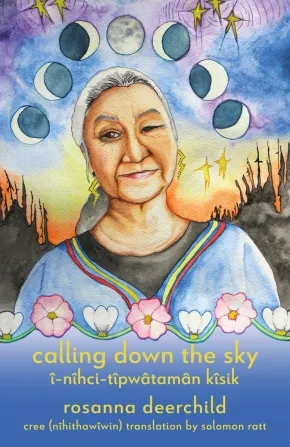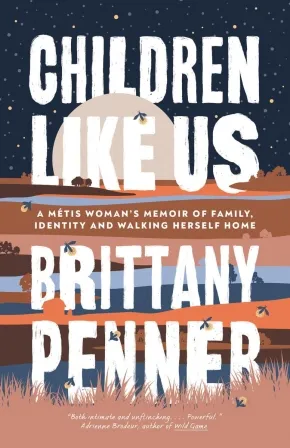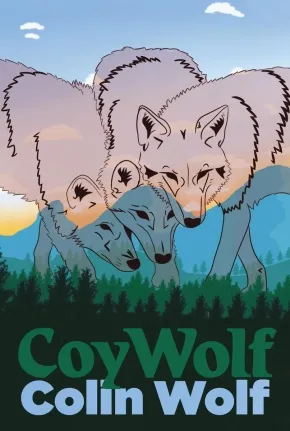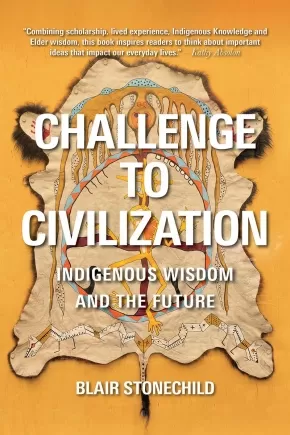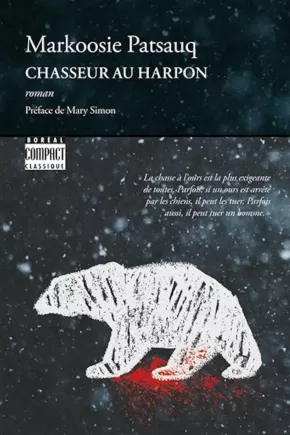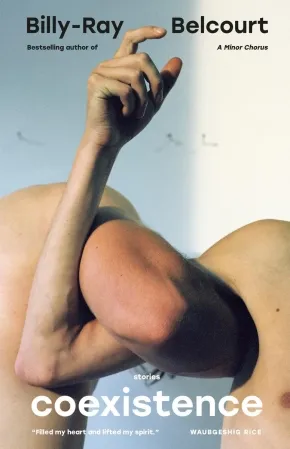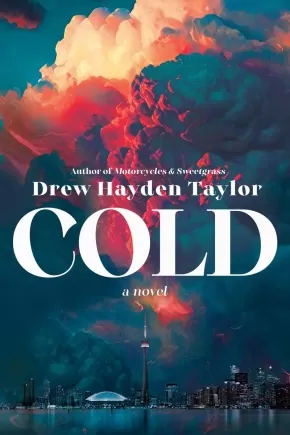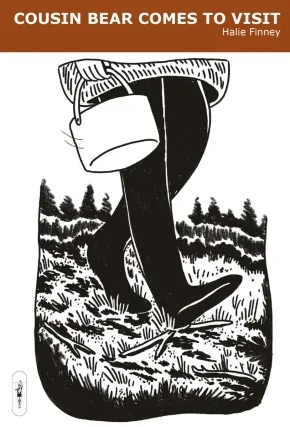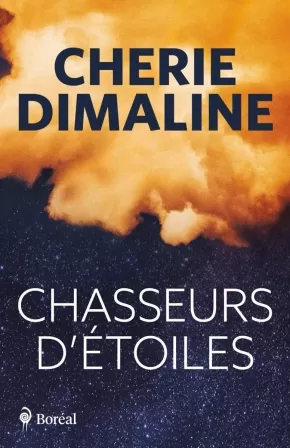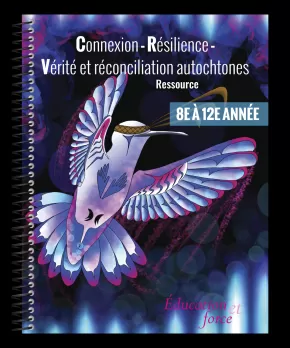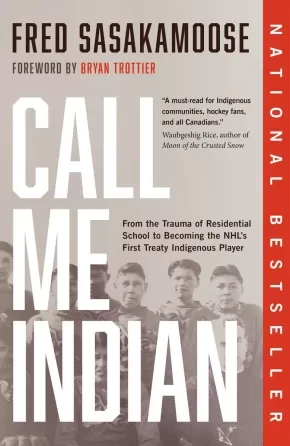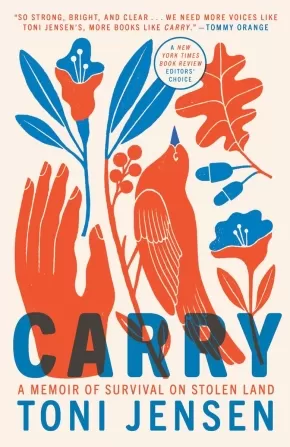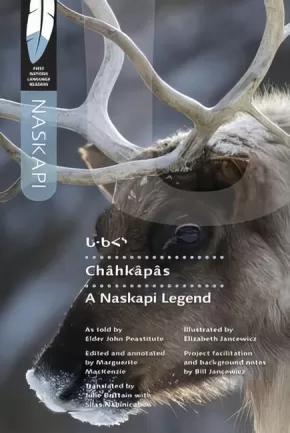
Browse Books for Teens
1
-
15
of
73 Results; (Teen Books Starting With "C")
Sort By
Go To
of 5
Calling Down the Sky: Tenth Anniversary Edition
$24.95
Text Content Territories:
Indigenous Canadian; Métis; Inuit; First Nations;
ISBN / Barcode: 9781552455159
Synopsis:
Synopsis:
A tenth anniversary bilingual edition in English and Cree of Rosanna Deerchild’s stunning collection about the intergenerational impacts of the Canadian residential school system.
you want me to
share my story
ok then
here it is
here in the unwritten
here in the broken lines
of my body that can never forget
In Calling Down the Sky, poet Rosanna Deerchild viscerally evokes her mother’s experience within the residential school system, the Canadian government’s system of violently removing Indigenous children from their homes, families, and languages in an explicit attempt to destroy Indigenous cultures and identities. With precise and intricate poetry, Deerchild weaves together the story of her mother’s childhood and Deerchild’s memories of her mother: her love of country music, her attempts to talk about what happened to her, how tightly she braided her daughter’s hair on the first day of school. In doing so, Deerchild illustrates the disruptive and devastating impacts of the residential school system on generations of families while also celebrating the life and culture of her mother and other survivors.
Published for the first time in a bilingual edition of Cree and English, in time for the tenth anniversary of the original publication, Calling Down the Sky is an intimate and gorgeously evoked reckoning with a horrifying part of North American history.
Reviews
“Rosanna Deerchild’s poems roll off the tongue as easy as old country songs. With her deft hand, Deerchild finely tunes every word and weaves them together as intimately as she braids her girls’ hair. Together, these poems create a story that sings with beautiful tension, amazing resilience, and love as big as the sky." - Katherena Vermette, Métis Writer
"The poetry collection, called calling down the sky, describes personal experiences with the residential school system in the 1950s and the generational effects it had." - CBC
"This poetry collection is fierce, raw and candid. It is also visceral, intricate and, above all, illuminating. By recounting her mother’s residential school experience in a powerfully poetic narrative, Deerchild expertly illustrates the heartbreaking trauma of that tragic saga and how it complicates relationships over generations. By beautifully and elaborately exploring those relationships and that devastating history, she finds and celebrates the resilient and hopeful spirit that many residential school survivors, like her mother, have managed to retain in the face of horror and torment. As a result, calling down the sky is an essential read in understanding the true modern history of this land and in honouring the people who survived it.” - Waubgeshig Rice
Educator Information
Bilingual: English and Cree
Additional Information
96 pages | 5.50" x 8.50"
Children Like Us: A Métis Woman's Memoir of Family, Identity and Walking Herself Home
$26.00
Format:
Paperback
Text Content Territories:
Indigenous Canadian; Métis;
Reading Level: N/A
ISBN / Barcode: 9780385688000
Synopsis:
Synopsis:
A Métis girl is adopted by a Mennonite family in this breathtaking memoir about family lost and found—for those who loved From the Ashes and Educated.
By the time Brittany Penner is seven years old, she has loved and lost twenty-one foster siblings who have come into her family and left—all of them Indigenous like her. "When will it be my turn?" she asks her mother time and time again. "When will I be taken away?" You won't be, she is told. You're adopted. You're here to stay. You're the lucky one.
On the day of her birth in 1989, near the end of the Sixties Scoop, Brittany was relinquished into the care of the government and adopted by a white Mennonite family in a small prairie town. Her name and where she came from are hidden from her; all she is told is that she is Métis. Her childhood is shaped by church, family, service and silence. Her family is continuously shifting as siblings arrive and depart, one by one. She knows that to stay, she has to force herself into the mold created for her. She must be obedient. Quiet. Good. No matter what.
Whenever she looks in the mirror, she searches her features, wondering if they've been passed down to her by her biological mother. She thinks, if she can find her mother, she'll find all the answers she's looking for. As Brittany moves into adulthood, she will uncover answers—but they will be more tangled than she could have imagined.
Children Like Us asks difficult questions about family, identity, belonging and cultural continuity. What happens when you find what you're looking for, but it can't offer you everything you need? How do you reckon with the truth of your own story when you've always been told you're lucky and should be grateful? What does it mean to belong when you feel torn between cultures? And how does a person learn to hold the pain and the grief, as well as the triumphs, the joys and the beauty, allowing none to eclipse the others?
Reviews
"Children Like Us is a luminous memoir about identity, loss and belonging. Adopted at birth by a white Mennonite family, Brittany Penner grows up straddling two worlds—one she knows and one that remains just out of reach. As she pieces together her origins, she reckons with the complexities of family, love and cultural displacement. Both intimate and unflinching, Children Like Us is a powerful exploration of what it means to know where you come from—and what it costs when that knowledge is withheld." —Adrienne Brodeur, nationally bestselling author of Wild Game
"An absolutely mesmerizing debut. It was a privilege to bear witness to Brittany Penner's story about intergenerational trauma, identity, and belonging. The kinds of complicated grief we so often experience in life are born out of the complexity of human relationships and our fierce ability to both hurt and heal one another. Penner explores this truth deftly, with wisdom, compassion and grace. I hope everyone reads this book." —Claire Bidwell Smith, author of The Rules of Inheritance
Additional Information
384 pages | 5.62" x 8.25" | Paperback
CoyWolf
$18.95
Format:
Paperback
Text Content Territories:
Indigenous Canadian; Métis;
Reading Level: N/A
ISBN / Barcode: 9780369105738
Synopsis:
Synopsis:
Isidor, a half-coyote, half-wolf coywolf, has always struggled to find his place as a half-breed. After the untimely death of his mother, he leaves his community to roam across prairies, forests, and mountains, sharing stories in his search for kinship and belonging. But as Sharp-Tooths are increasingly policed, tagged, or killed to make way for insatiable human expansion, Isidor and his pack are forced to make impossible decisions. Do they retreat to better their chances of survival, or risk everything by joining a resistance of rogue animals to protect what’s left of their homeland?
In this gripping drama, Colin Wolf weaves a powerful allegory through the lives of animals, paralleling the displacement of Métis people and the enduring struggle for Indigenous land rights on Turtle Island. CoyWolf is a hopepunk thriller and a roadmap for young revolutionaries navigating the realities of resistance, doing your best, and learning the wisdom of those who have walked the path before.
Additional Information
112 pages | 5.12" x 7.62" | Paperback
Challenge to Civilization: Indigenous Wisdom and the Future
$29.95
Format:
Paperback
Text Content Territories:
Indigenous;
ISBN / Barcode: 9780889779815
Synopsis:
Synopsis:
Rediscovering, valuing, and embracing Indigenous spirituality and wisdom is critical for humanity to survive in the future.
Civilization is a western, Eurocentric construct borne from a distrust of nature, a desire to endlessly exploit it and profit from it. Despite being a relatively recent development, civilization’s inherent logic has resulted in over-population, inequality, poverty, misery, war, and climate change and now threatens humanity’s very survival. How can humanity expect to survive if it continues to look for solutions from the very structures and ideologies that have brought it to the brink of extinction?
In this final book of his trilogy, Dr. Blair Stonechild deftly illustrates how Indigenous spirituality, wisdom, and land-based knowledge is critical to human survival in the face of environmental destruction and human-induced climate change. Reinterpreting world history from an Indigenous perspective, Stonechild’s solution to this unfolding catastrophe is “ecolization,” a state in which humans recognize they are not the central purpose of creation and a way of existing harmoniously with the natural and spiritual worlds.
Beautifully written, urgent, and critical, Challenge to Civilization reminds us that it is not Earth that is in danger of extinction, but ourselves, and Indigenous spiritual wisdom can be the guiding light through what will otherwise be humanity’s final, ever-darkening days.
Reviews
"Stonechild examines the history of Eurocentric knowledge and how it does not comport with Indigenous wisdom. The narrow, individualistic definitions of “civilized” imposed by Western philosophy, academia, and ontology have shaped our world, with lasting consequences. By undervaluing Indigenous wisdom, inextricably tied to the Land, humans have developed a fear of nature, creating a potentially irreparable rift that can only be bridged by recognizing how disconnected humans have become from their place in the natural world. Stonechild warns this is a time of reckoning where our survival on this planet and the balance of nature cannot be restored unless humans redefine knowledge and what it means to be civilized." - Stacey M., High School Teacher, Indigenous Books for Schools
Educator Information
This book is included in the Indigenous Books for Schools database from the Association of Book Publishers of BC. It is recommended for Grades 10 to 12 for English Language Arts, Science, Social Studies, and Technology.
Additional Information
184 pages | 6.00" x 9.00" | Paperback
Chasseur au harpon
$14.95
Format:
Paperback
Text Content Territories:
Indigenous Canadian; Inuit;
Reading Level: N/A
ISBN / Barcode: 9782764628089
Synopsis:
Synopsis:
Les ours mettent souvent les hommes en échec, même quand ils sont traqués. La chasse à l’ours est la plus exigeante de toutes. Parfois, si un ours est arrêté par les chiens, il peut les tuer. Parfois aussi, il peut tuer un homme. Les ours blancs sont terribles. On les chasse malgré tout, car il n’y a pas le choix. Ils donnent de la nourriture et des vêtements. En pleine tempête de neige, un ours polaire attaque un campement inuit et éviscère de nombreux chiens. Convaincus que l’animal est malade et qu’il s’en prendra de nouveau aux leurs, des chasseurs se lancent à sa poursuite au péril de leur vie. Parmi eux, le jeune Kamik, qui rêve de manier le harpon avec la même aisance que son père, découvrira rapidement les dangers d’une existence que l’environnement arctique ne cesse de menacer.Paru il y a cinquante ans, Chasseur au harpon est considéré comme le premier roman en inuktitut jamais publié. Dans ce livre qui a grandement contribué à l’essor de la littérature autochtone au Canada, Markoosie Patsauq nous offre une aventure trépidante, marquée de bout en bout par la violence et la mort, et nous plonge dans la réalité d’une communauté encore préservée de l’intrusion de la modernité. Surtout, à travers la traque symbolique d’un ours et le dur apprentissage d’un jeune garçon, il met en scène le combat immémorial que ces hommes et ces femmes doivent livrer pour survivre. Pour la toute première fois, cette édition propose une traduction en français établie à partir du texte original en inuktitut, et non à partir de son adaptation en anglais. Accompagnée d’une préface de la gouverneure générale du Canada Mary Simon, ancienne présidente du Conseil circumpolaire inuit, d’une postface inédite de Patsauq et d’une note des traducteurs, elle offre une lecture nouvelle et une remise en contexte bienvenue de ce roman fondateur.
Educator Information
This book is available in English: Hunter with Harpoon
Additional Information
Paperback
Coexistence: Stories (PB)
$23.00
Format:
Paperback
Text Content Territories:
Indigenous Canadian;
ISBN / Barcode: 9780735242050
Synopsis:
Synopsis:
A collection of intersecting stories about Indigenous love and loneliness from one of contemporary literature’s most boundless minds.
Across the prairies and Canada’s west coast, on reserves and university campuses, at literary festivals and existential crossroads, the characters in Coexistence are searching for connection. They’re learning to live with and understand one another, to see beauty and terror side by side, and to accept that the past, present, and future can inhabit a single moment.
An aging mother confides in her son about an intimate friendship from her distant girlhood. A middling poet is haunted by the cliché his life has become. A chorus of anonymous gay men dispense unvarnished truths about their sex lives. A man freshly released from prison finds that life on the outside has sinister strictures of its own. A PhD student dog-sits for his parents at what was once a lodging for nuns operating a residential school—a house where the spectre of Catholicism comes to feel eerily literal.
Bearing the compression, crystalline sentences, and emotional potency that have characterized his earlier books, Coexistence is a testament to Belcourt’s mastery of and playfulness in any literary form. A vital addition to an already rich catalogue, this is a must-read collection and the work of an author at the height of his powers.
Reviews
“Belcourt is one of the finest and most sublime writers at work today. This book is a feat of beauty and compression, every sentence reinventing the reader. It’s like entering a quiet room or a secret lake. It’s about our coexistence with lovers, kin, enemies, but also our coexistence with desire, solitude, and an intelligence that in itself is a form of hunger—language as solace, language as light. Belcourt is the rare writer who composes from, to, and because of the soul. It’s been some time since I loved a book so deeply.”—Claudia Dey, author of Daughter
“Through the interconnected lifeworlds contained in Coexistence, we hear a defiantly loving and astoundingly honest response to colonial and racial violence. Billy-Ray Belcourt has written an homage and an elegy to a still-unfolding history—as intimate and hopeful as young romance, as mysterious and life-giving as family. I adore this collection.” —Tsering Yangzom Lama, author ofWe Measure the Earth with our Bodies
“Coexistence filled my heart and lifted my spirit. There are few writers who can authentically capture the beauty and complexity of Indigenous existence both on the rez and in the city like Billy-Ray Belcourt. This book is a resolute proclamation of resilient Indigenous humanity and the nuance and richness we all embody. The stories weave and enrich on journeys that are both familiar and informative. Coexistence is a powerful celebration and a gift to the world.” —Waubgeshig Rice, author of Moon of the Turning Leaves
“Billy-Ray Belcourt masterfully portrays the complexities of Indigenous lives, longing, and belonging through these stories. There are sentences in this collection that I didn’t know I had been waiting to read; my breath caught on several of them. I suspect that readers will be letting out collective sighs while reading this book.”—Helen Knott, author of Becoming a Matriarch
“Billy-Ray Belcourt’s Coexistence is a brilliant exploration of the boundaries both imposed and imagined that exist between beings and the spaces we inhabit. I wildly admire Belcourt’s crisp prose and remarkable insights, yet what haunts me most about these powerful stories is the author’s heart-blasted willingness to be vulnerable on the page. This engaging, alive text drills right to heart of what it is to be Indigenous in the twenty-first century.”—Mona Susan Power, author of A Council of Dolls
Additional Information
208 pages | 4.93" x 7.48" | Paperback
Cold: A Novel
$24.95
Format:
Paperback
Text Content Territories:
Indigenous Canadian; First Nations; Anishinaabeg; Cree (Nehiyawak);
Reading Level: N/A
ISBN / Barcode: 9780771002892
Synopsis:
Synopsis:
A tragic plane crash that leaves two women stranded and fighting for their lives kicks off this sweeping and hilarious novel from award-winning writer Drew Hayden Taylor that blends thriller, murder mystery, and horror with humour and spectacle.
Elmore Trent is a professor of Indigenous studies who finds himself entangled in an affair that's ruining his marriage; Paul North plays in the IHL (Indigenous Hockey League), struggling to keep up with the game that's passing him by; Detective Ruby Birch is chasing a string of gruesome murders, with clues that conspicuously lead her to both Elmore and Paul. And then there's Fabiola Halan, former journalist-turned-author and famed survivor of a plane crash that sparked a nationwide tour promoting her book.
What starts off as a series of subtle connections between isolated characters quickly takes a menacing turn, as it becomes increasingly clear that someone—or something—is hunting them all.
Taking tropes from the murder mystery, police procedural, thriller, and horror genres, Drew Hayden Taylor weaves a pulse-pounding and propulsive narrative with an intricate cast of characters, while never losing the ability to make you laugh.
Reviews
"Cold is an absolutely enthralling novel from a legendary writer and storyteller. Drew Hayden Taylor is a master of genuinely capturing contemporary Indigenous realities in fiction, making the vibrant characters in this exceptional story relatable and real. Cold is creepy and funny, smart and lively, and overall a strikingly dynamic book that will keep readers on edge from start to finish."—Waubgeshig Rice, author of Moon of the Crusted Snow and Moon of the Turning Leaves
"The myth of the Wendigo has shaped narratives from Pet Semetary to Shadow Country to The Hunger—but never in my reading has it been so cleverly and relevantly employed as it is in Drew Hayden Taylor's serpentine and haunting new novel, Cold." —Nick Cutter, author of The Troop and Little Heaven
Additional Information
368 pages | 5.50" x 8.25" | Paperback
Cousin Bear Comes to Visit
$10.00
Artists:
Format:
Paperback
Text Content Territories:
Indigenous Canadian; Métis;
ISBN / Barcode: 9781772620993
Synopsis:
Synopsis:
A tender tale of two cousins
In Cousin Bear Comes to Visit, Metis artist Halie Finney introduces us to Francis the Bear as she prepares to reunite with her cousin. The pair haven't seen one another in quite awhile, so it's time to catch up, laugh–and uncover Cousin's big secret.
This debut work by Halie reveals a small snippet of the mythology of characters that she has created and modeled after her own hometown and the people who reside there. She uses the tales that come from her imagined world to explore themes of family, nostalgia, and grief from Indigenous and small-town perspectives.
Educator Information
The publisher recommends this work for ages 12+.
Additional Information
120 pages | 4.25" x 6.25" | Paperback
Carving Space: The Indigenous Voices Awards Anthology
$24.95
Editors:
Format:
Paperback
Text Content Territories:
Indigenous Canadian; Métis; Inuit; First Nations;
ISBN / Barcode: 9780771004858
Synopsis:
Synopsis:
To celebrate the fifth anniversary of the Indigenous Voices Awards, an anthology consisting of selected works by finalists over the past five years, edited by Jordan Abel, Carleigh Baker, and Madeleine Reddon.
For five years, the Indigenous Voices Awards have nurtured the work of Indigenous writers in lands claimed by Canada. Established in 2017 initially through a crowd-funded campaign by lawyer Robin Parker and author Silvia Moreno-Garcia that set an initial fundraising goal of $10,000, the initiative raised over $116,000 in just four months.
Through generous support from organizations such as Penguin Random House Canada, CELA, and others, the award has grown and have helped usher in a new and dynamic generation of Indigenous writers. Past IVA recipients include Billy-Ray Belcourt, Tanya Tagaq, and Jesse Thistle. The IVAs also help promote the works of unpublished writers, helping launch the careers of Smokii Sumac, Cody Caetano, and Samantha Martin-Bird.
For the first time, a selection of standout works over the past five years of the Indigenous Voices Award will be collected in an anthology that will highlight some of the most groundbreaking Indigenous writing across poetry, prose, and theatre in English, French, and in an Indigenous language. Curated by award-winning and critically acclaimed writers Carleigh Baker, Jordan Abel, and Indigenous scholar Madeleine Reddon, this anthology will be a true celebration of Indigenous storytelling that will both introduce readers to emerging luminaries as well as return them to treasured favourites.
Educator Information
Carving Space: The Indigenous Voices Awards Anthology: A collection of prose and poetry from emerging Indigenous writers in lands claimed by Canada includes a selection of standout work from the first five years of the Indigenous Voices Awards.
Additional Information
400 pages | 5.50" x 8.25" | Paperback
Chasseurs d'étoiles
$26.95
Format:
Paperback
Text Content Territories:
Indigenous Canadian; Métis;
ISBN / Barcode: 9782764627648
Synopsis:
Synopsis:
Lorsqu’il se réveille seul dans le noir, Frenchie comprend tout de suite où il a échoué. Au fil des ans, l’adolescent métis a vu ses proches disparaître un à un dans ces pensionnats où les siens sont réduits à l’état de cobayes et torturés.Alors que les épidémies et les catastrophes naturelles ont emporté des millions de personnes et privé les survivants de la faculté de rêver, seuls les peuples autochtones ont su la conserver dans la moelle de leurs os. Depuis, ils sont traqués par le gouvernement, qui les enferme pour nourrir les Sans-rêves de la précieuse substance.Frenchie, qui a appris à survivre en forêt en compagnie de sa famille d’adoption, est pourtant loin de se douter de tous les sacrifices qu’il devra faire pour retrouver sa liberté, et des terribles vérités qui lui seront révélées en chemin.Dans Chasseurs d’étoiles, Cherie Dimaline renoue avec les personnages attachants qui ont fait le succès de Pilleurs de rêves. Surtout, elle évoque de manière bouleversante quelques-unes des pages les plus sombres de notre histoire.
Educator Information
Recommended for ages 12+
This book is available in English: Hunting by Stars
Additional Information
480 Pages
Connexion - Résilience - Vérité et réconciliation autochtones Ressource - 8e à 12e année
$29.95
Artists:
Format:
Coil Bound
Text Content Territories:
Indigenous Canadian; First Nations; Inuit; Métis;
ISBN / Barcode: 978-1-990448-39-3
Synopsis:
Synopsis:
Ce livre est conçu pour éduquer tous les enfants et les jeunes - nos futurs dirigeants - sur l'histoire Autochtone et les événements actuels. Il est destiné à mieux faire comprendre et à contribuer positivement à la réconciliation.
Ensemble, nous devons tenir compte du passé, du présent et de l'avenir dans nos efforts pour nous améliorer et améliorer les générations futures.
Ce livre offre une multitude d'articles et d'activités d'apprentissage de haute qualité, comprenant des Unitéés et des leçons qui peuvent être utilisées par n'importe qui enseignants, parents, étudiants, professionnels des affaires qui peut avoir peu ou pas de connaissances ou de compréhension préalables des Peuples ou des sujets Autochtones.
Dans ce livre, vous rencontrerez de vrais Peuples Autochtones qui s'expriment et partagent leurs histoires et expériences directes, et vous entendrez clairement leur passion pour la réconciliation.
Ce livre est unique, les histoires racontées dans ses couvertures sont uniques, tout comme chacun travaille à travers son propre voyage de compréhension et de faire sa petite part vers la réconciliation.
Educator Information
Recommended for grades 8 to 12.
A $5 per book discount is applied to a purchase of 10 or more books.
This workbook is available in English: Connecting – Resilience – Indigenous Truth & Reconciliation ‘CRITR’ Workbook: Grade 8 - 12
Additional Information
Spiral bound
Call Me Indian: From the Trauma of Residential School to Becoming the NHL's First Treaty Indigenous Player
$21.00
Format:
Paperback
Text Content Territories:
Indigenous Canadian; First Nations; Cree (Nehiyawak); Plains Cree; Ahtahkakoop Cree Nation;
Reading Level: N/A
ISBN / Barcode: 9780735240032
Synopsis:
Synopsis:
Trailblazer. Residential school Survivor. First Treaty Indigenous player in the NHL. All of these descriptions are true--but none of them tell the whole story.
Fred Sasakamoose, torn from his home at the age of seven, endured the horrors of residential school for a decade before becoming one of 120 players in the most elite hockey league in the world. He has been heralded as the first Indigenous player with Treaty status in the NHL, making his official debut as a 1954 Chicago Black Hawks player on Hockey Night in Canada and teaching Foster Hewitt how to pronounce his name. Sasakamoose played against such legends as Gordie Howe, Jean Beliveau, and Maurice Richard. After twelve games, he returned home.
When people tell Sasakamoose's story, this is usually where they end it. They say he left the NHL to return to the family and culture that the Canadian government had ripped away from him. That returning to his family and home was more important to him than an NHL career. But there was much more to his decision than that. Understanding Sasakamoose's choice means acknowledging the dislocation and treatment of generations of Indigenous peoples. It means considering how a man who spent his childhood as a ward of the government would hear those supposedly golden words: "You are Black Hawks property."
Sasakamoose's story was far from over once his NHL days concluded. He continued to play for another decade in leagues around Western Canada. He became a band councillor, served as Chief, and established athletic programs for kids. He paved a way for youth to find solace and meaning in sports for generations to come. Yet, threaded through these impressive accomplishments were periods of heartbreak and unimaginable tragedy--as well moments of passion and great joy.
This isn't just a hockey story; Sasakamoose's groundbreaking memoir sheds piercing light on Canadian history and Indigenous politics, and follows this extraordinary man's journey to reclaim pride in an identity and a heritage that had previously been used against him.
Reviews
“Fred Sasakamoose played in the NHL before First Nations people had the right to vote in Canada. This page turner will have you cheering for “Fast Freddy” as he faces off against huge challenges both on and off the ice—a great gift to every proud hockey fan, Canadian, and Indigenous person.”—Wab Kinew, Leader of the Manitoba NDP and author of The Reason You Walk
“Call Me Indian needs to be in every library and on every school curriculum in Canada. Fred Sasakamoose’s story is gripping and powerfully told—a story of triumph and tragedy, of great success and the perils of excess. There is laughter and tears here aplenty, but also inspiration. Characters as large as Gordie Howe and Bobby Hull are easily matched by the likes of Moosum, Freddy’s grandfather; Father Roussel, the only good to be found in residential school; George Vogan, who always believed in Fred—and Loretta, who loved him, gave him family, and ultimately saved him.”—Roy MacGregor, bestselling author of Chief: The Fearless Vision of Billy Diamond and Canadians: Portrait of a Country
Additional Information
288 pages | 5.20" x 7.94" | 8 pp 4/c photo insert
Meg Masters assisted Fred in writing his memoir. She is a Toronto-based writer and editor who has worked with many bestselling Canadian authors.
Creeboy
$16.95
Format:
Paperback
Text Content Territories:
Indigenous Canadian;
ISBN / Barcode: 9781459416789
Synopsis:
Synopsis:
In the literary tradition of The Outsiders comes a coming-of-age novel about teen boys and Indigenous gangs.
Sixteen-year-old Josh is no stranger to gang life. His dad, the leader of the Warriors, a gang on their reserve, is in jail, and Josh’s older brother has taken charge.
Josh’s mom has made it clear the Warriors and their violence aren’t welcome in her home — Josh’s dad and brother included. She wants Josh to focus on graduating high school. Josh is unsure whether gang life is for him — that is until gang violence arrives on his doorstep.
Turning to the Warriors, Josh, now known as “Creeboy,” starts down the path to becoming a full gang member — cutting himself off from his friends, family and community outside the gang.
It’s harder than ever for Creeboy to envision a different future for himself. Will anything change his mind?
Educator Information
Interest ages 13 to 18.
Written for reluctant readers.
Fry Reading Level: 2.0
Lexile measure: HL590L
Recommended in the Canadian Indigenous Books for Schools resource collection for grades 9 to 12 for English Language Arts.
Content Warning: References death and violence.
Additional Information
128 pages | 5.51" x 8.50" | Paperback
Carry: A Memoir of Survival on Stolen Land
$24.00
Format:
Paperback
Text Content Territories:
Indigenous American; Métis;
Grade Levels: 12; University/College;
ISBN / Barcode: 9781984821201
Synopsis:
Synopsis:
Toni Jensen grew up around guns: As a girl, she learned to shoot birds in rural Iowa with her father, a card-carrying member of the NRA. As an adult, she’s had guns waved in her face near Standing Rock, and felt their silent threat on the concealed-carry campus where she teaches. And she has always known that in this she is not alone. As a Métis woman, she is no stranger to the violence enacted on the bodies of Indigenous women, on Indigenous land, and the ways it is hidden, ignored, forgotten.
In Carry, Jensen maps her personal experience onto the historical, exploring how history is lived in the body and redefining the language we use to speak about violence in America. In the title chapter, Jensen connects the trauma of school shootings with her own experiences of racism and sexual assault on college campuses. “The Worry Line” explores the gun and gang violence in her neighborhood the year her daughter was born. “At the Workshop” focuses on her graduate school years, during which a workshop classmate repeatedly killed off thinly veiled versions of her in his stories. In “Women in the Fracklands,” Jensen takes the reader inside Standing Rock during the Dakota Access Pipeline protests and bears witness to the peril faced by women in regions overcome by the fracking boom.
In prose at once forensic and deeply emotional, Toni Jensen shows herself to be a brave new voice and a fearless witness to her own difficult history—as well as to the violent cultural landscape in which she finds her coordinates. With each chapter, Carry reminds us that surviving in one’s country is not the same as surviving one’s country.
Reviews
“Like a murmuration of starlings, Toni Jensen’s new book Carry changes its shape constantly and effortlessly. . . . The value of Carry lies in its unique structure, its sparse, powerful prose, and in the stinging perspective it provides on events that are numbingly common. Until we see it as clearly as Jensen does, the lens she offers on gun violence in America will be relevant again and again and again.”—Chicago Review of Books
“In Carry, Jensen scours language to find a new way of writing about how historical injustices seep into the present. . . . With a controlled voice like a Philip Glass composition, smooth, meandering yet repetitive, Jensen considers her troubled past and begins the work of stitching herself back together. . . . An unsettling account that creeps into your bones.”—The New York Times Book Review
“Toni Jensen grew up around guns. But bird-hunting with her father was a much different experience than staring down bored barrels at Standing Rock. A new and much-needed voice, Métis author Jensen shares her deepest thoughts and most emotional experiences in Carry.”—Bustle
“Toni Jensen’s memoir is stunning. There’s no other words that come to mind—it’s about growing up Métis, existing as an Indigenous woman in America, and the looming threat of ever-pervasive gun violence. . . . A must-read.”—Alma (Alma’s Favorite Books for Fall 2020)
“Moving between personal recollections and historical observations, Jensen narrates what it means to be Métis, and what it feels like to be connected by bodies and land. . . . A meditative exploration of people and place that shows what it means to live and survive.”—Library Journal
“[A] debut memoir from a Native author enmeshed in the American way of violence, alienation, and death . . . a powerful rejection of a culture that has always been grounded in violence and intimidation.”—Kirkus Reviews
“Carry explores the gun’s tragic impact with heartfelt prose and deep intellect—on politics, on history, on Black and Indigenous bodies, on women’s bodies, and on children behind closed doors . . . It is full of difficult and vital news, delivered right on time.”—Terese Marie Mailhot, New York Times bestselling author of Heart Berries
Additional Information
304 pages | 5.24" x 7.94" | Paperback
Châhkâpâs: A Naskapi Legend
$24.95
Artists:
Editors:
Format:
Paperback
Text Content Territories:
Indigenous Canadian; First Nations; Innu (Montagnais-Naskapi);
Grade Levels: 12; University/College;
ISBN / Barcode: 9780889778290
Synopsis:
Synopsis:
Châhkâpâs: A Naskapi Legend shares the story of Châhkâpâs, a heroic figure in First Nations storytelling, who performs feats of strength and skill in spite of his diminutive size.
The book shares this traditional legend as originally recorded in the Naskapi community in northern Quebec in 1967 when it was narrated by John Peastitute, a Naskapi Elder and accomplished storyteller. Transcribed in the Naskapi language and syllabic orthography, the book offers a literary resource for the Naskapi language community, and the English translation enables those unfamiliar with the language, or the story, to discover this important legend.
The book also contains extensive analysis of stories about Châhkâpâs, notes about the provenance of the recordings, a biography of the storyteller, and a history of the Naskapi people. Lavish illustrations from Elizabeth Jancewicz—an artist raised in the Naskapi community—provide a sensitive and accurate graphical account of the legend, which has also been approved by Naskapi speakers themselves.
Educator & Series Information
This book is part of the First Nation Language Readers series. With a mix of traditional and new stories, each First Nations Language Reader introduces an Indigenous language and demonstrates how each language is used today.
By John Peastitute
Edited by Marguerite MacKenzie
Translated by Julie Brittain and Silas Nabinicaboo
Illustrated by Elizabeth Jancewicz
Contributions by Bill Jancewicz
Additional Information
264 pages | 6.00" x 9.00" | Paperback
Sort By
Go To
of 5

